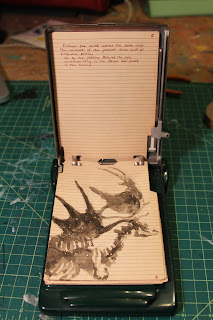My address book bestiary project continues, slowly. Every so often I'll have an evening where I can sit down and crank out a few small drawings. Here's a recent one - O for Olm, an endangered, blind salamander that only lives on the Dalmatian coast:

I've been thinking for a few months about what kind of text to pair with these illustrations, whether I want to label any of the animals, etc. I have always been drawn to words and writing as an artist, just as likely to write about my ideas as sketch them (I'm not sure how typical that is - artists are generally stereotyped as right-brained, intuitive individuals. I'm not, but I'm also not sure that binary is particularly helpful, descriptive, or meaningful for anyone!). Much - probably the majority - of my work is inspired by books, articles, and poetry that I read, although in this case, I started making a bestiary first and felt later that I should pair some kind of text with it, since bestiaries generally do have text to go with the illustrations.
I had thought I'd settled on using a famous William Blake poem,
The Auguries of Innocence, but I'm not so sure anymore. Parts of it are very lovely and evocative, but maybe a little heavy-handed. I currently feel as though parts of a favorite book of mine might suit these drawings better -
Out of Eden: An Odyssey of Ecological Invasion, by Alan Burdick (Syracuse, NY native, represent!!). I picked up this book at a yard sale years ago, and I fell right into the rabbit hole of long-form, serious ecological reporting that has since informed a lot of my work. (Predictably,
David Quammen and
Charles Mann also take up burgeoning territory on my bookshelf.) It's been hugely influential in helping me understand a post-modern sense of the word "natural" in the context of a very globalized world. Some of the excerpts I've highlighted:
Once, in a museum, I saw the rings of a tree fossilized in a sheet of limestone: an entire lifetime fixed on the thinnest slice of a far longer, inanimate one. Perhaps the mind works the same way. The moments of the present come and go between blinks, one by one falling behind the eye, accumulating in the brain like chalk in the seabed. Only much later, in the tracing of deposited layers, does the experience of nature acquire a discernible shape: these are the sea shells I saw on the beach as a boy, this is the tree I climbed in, this is the bird I heard at the close of day. The stars were brighter then, there were fewer deer, it snowed more in the winter. How deep do the strata run? How much time does the mind contain? How long before the memories within are reshaped by the added weight of new sediment -- before the bottommost and oldest memories buckle, dissolve, and re-form, and one can no longer distinguish what really happened from the way one remembers it? That is perhaps the most vexing challenge posed by alien species: how to delineate natural history from the eye that perceives it. An inspector for the Hawaii Department of Agriculture ruefully put it to me this way: "Nature is defined by human memory, which is infinitely shorter than ecological memory." (from Chapter 6)
"The natural world is far more dynamic, far more changeable, and far more entangled with human history than popular beliefs about the 'balance of nature' have typically acknowledged," writes the environmental historian William Cronon. "The task is to find a human history that is
within nature, rather than without it." (from Chapter 14)
So... Burdick is maybe not as accessible as Blake, but I think his philosophy of nature possesses the shades of complexity I explore in some of my work.







